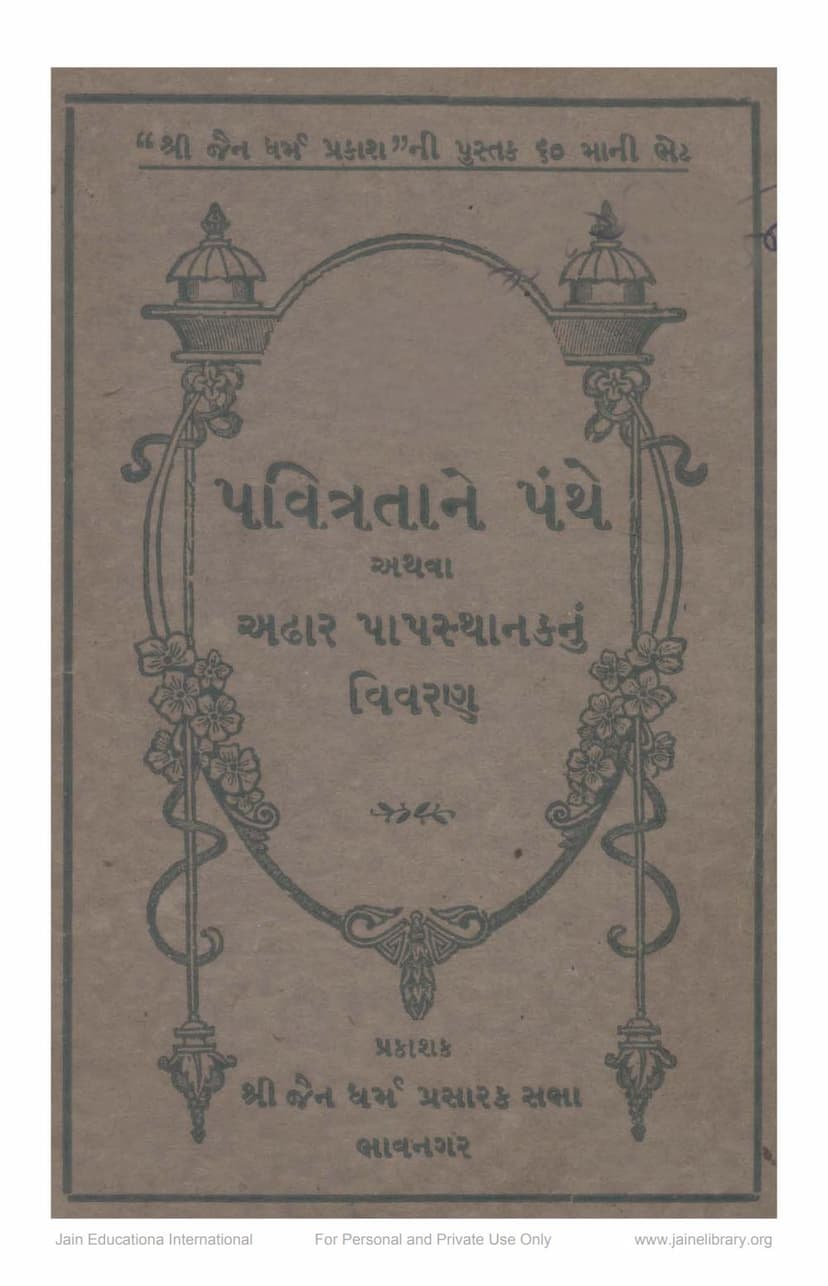Pavitratane Panthe Athwa 18 Papsthanaknu Vivran
Added to library: September 2, 2025

Summary
Here's a comprehensive summary of the Jain text "Pavitratane Panthe athwa 18 Papsthanaknu Vivran" by Manilal N Doshi, based on the provided pages:
Title: Pavitratane Panthe athwa 18 Papsthanaknu Vivran (On the Path of Purity or A Description of the Eighteen Centers of Sin) Author: Manilal N Doshi Publisher: Jain Dharm Prasarak Sabha, Bhavnagar Publication Year: V.S. 2000 (1943-1944 CE)
Overall Theme: This book is a guide to spiritual purification according to Jain principles, focusing on understanding and renouncing the "18 Papsthanaks" (centers of sin or unrighteous conduct). The author emphasizes that true purity is the inherent nature of the soul, which is currently obscured by unnatural tendencies. The book aims to explain the nature of these sins, their consequences, and the thoughts and actions needed to overcome them.
Core Concepts:
- The True Nature of the Soul: The soul is described as inherently pure, possessing infinite knowledge, power, and bliss. It is the source of truth, love, and compassion. However, the soul's natural radiance is blocked by "unnatural" or "unwholesome" tendencies called "Papsthanaks."
- The 18 Papsthanaks: These are categorized as the root causes of sin and spiritual obstruction. The book systematically describes each of them.
- The Five Main Papsthanaks (First Five): These are considered primary and essential to renounce. They are:
- Pranaatipata Viraman (Abstinence from Harming Life): This is identified as the root of all sin and the foundation of all good. It encompasses not just killing but also causing harm, burdening, and mistreating any living being, including through words and thoughts.
- Mrushavada Viraman (Abstinence from Falsehood): This covers all forms of untruthfulness, including lying, exaggeration, deceit, and speaking words that cause harm or disbelief. The importance of truthfulness for trust and reputation is highlighted.
- Adattadana Viraman (Abstinence from Stealing/Taking What is Not Given): This includes any form of taking what is not rightfully given, whether through theft, cheating, fraud, or exploitation. Financial integrity is stressed.
- Maithuna Viraman (Abstinence from Unchastity/Improper Sexual Conduct): This emphasizes celibacy for the pure and restraint and faithfulness within marriage for householders. It touches upon the power of desire and the importance of controlling sensory impulses.
- Parigraha Viraman (Abstinence from Accumulation/Possessiveness): This refers to excessive attachment and accumulation of possessions beyond one's genuine needs. It's about renouncing the possessive mindset rather than the items themselves. The book lists nine categories of possessions subject to this principle.
- The Thirteen Supporting Papsthanaks (Next Thirteen): These are seen as reinforcing the first five, often stemming from them, and include: 6. Krodha Viraman (Abstinence from Anger) 7. Mana Viraman (Abstinence from Pride/Arrogance) 8. Maya Viraman (Abstinence from Deceit/Illusion) 9. Lobha Viraman (Abstinence from Greed/Attachment) 10. Raga Viraman (Abstinence from Attachment/Fondness) 11. Dvesha Viraman (Abstinence from Aversion/Hatred) 12. Kalaha Viraman (Abstinence from Quarrels/Conflict) 13. Abhyakhyana Viraman (Abstinence from False Accusation) 14. Paishunya Viraman (Abstinence from Slander/Gossip) 15. Rati-Arati Viraman (Abstinence from Excessive Fondness/Dislike, or worldly attachment/aversion) 16. Paraparivada Viraman (Abstinence from Criticizing Others) 17. Mayamrurshavada Viraman (Abstinence from Deceptive Falsehood) 18. Mithyatva Shalya Viraman (Abstinence from False Beliefs/Spiritual Delusions)
- The Five Main Papsthanaks (First Five): These are considered primary and essential to renounce. They are:
- The Power of the Soul: The text repeatedly stresses the immense, inherent power of the soul. Just as a match can dispel darkness, introspection and conscious effort can reveal the soul's dormant capacities. The key is to remove the obstacles (Papsthanaks) that prevent this power from manifesting.
- Mind, Speech, and Action: The book explains that sin is committed through thoughts, words, and actions. Even harboring harmful intentions or dwelling on negative thoughts is considered a form of sin.
- Overcoming Sin: The author advocates for cultivating virtues that oppose these sins. For example, forgiveness counters anger, humility counters pride, and simplicity counters deceit. Conscious effort, introspection, and the cultivation of positive qualities are presented as the path to liberation.
- Examples and Analogies: The book uses numerous examples and analogies to illustrate its points, such as the serpent's venom, sunlight blocked by clouds, the pressure of air, and stories of spiritual exemplars like Gajasukumar.
Key Takeaways:
- Purity is Innate: The goal isn't to become pure but to uncover the existing inherent purity of the soul.
- Mind is the Root: Many sins originate in the mind through thoughts and desires. Controlling the mind is paramount.
- Virtue Against Vice: Cultivating opposing virtues is the practical method to eradicate sins.
- Consequences of Sin: The text details the negative repercussions of each sin, both in this life (loss of trust, reputation, peace) and in future lives (suffering, unfavorable rebirths).
- Importance of Right Belief (Samyak Darshan): The 18th Papsthanak, Mithyatva Shalya (False Belief), is highlighted as the most critical obstacle, leading to all other sins. Correct understanding and firm faith in Jain principles are essential for spiritual progress.
- Practical Guidance: The book offers practical advice on how to cultivate virtues like sincerity, contentment, non-violence, truthfulness, and detachment.
Structure: The book systematically dedicates chapters to each of the 18 Papsthanaks, explaining their nature, consequences, and methods of renunciation. The initial chapters also lay the philosophical groundwork about the soul's true nature and the role of these obstacles.
In essence, "Pavitratane Panthe" serves as a detailed manual for Jain practitioners, guiding them through the complex path of self-discipline and spiritual growth by dissecting the manifestations of "sin" and offering a roadmap to a pure and liberated existence.